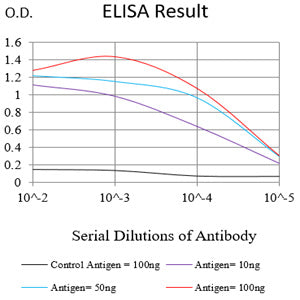
| WB | 1/500 - 1/2000 | Human,Mouse,Rat |
| IF | 咨询技术 | Human,Mouse,Rat |
| IHC | 1/200-1/1000 | Human,Mouse,Rat |
| ICC | 技术咨询 | Human,Mouse,Rat |
| FCM | 1/200-1/400 | Human,Mouse,Rat |
| Elisa | 1/10000 | Human,Mouse,Rat |
| Aliases | FCC2; COCA2; HNPCC; hMLH1; HNPCC2 |
| Entrez GeneID | 4292 |
| clone | 7A7C8 |
| WB Predicted band size | 84.6kDa |
| Host/Isotype | Mouse IgG1 |
| Antibody Type | Primary antibody |
| Storage | Store at 4°C short term. Aliquot and store at -20°C long term. Avoid freeze/thaw cycles. |
| Species Reactivity | Human |
| Immunogen | Purified recombinant fragment of human MLH1 (AA:381-483) expressed in E. Coli. |
| Formulation | Purified antibody in PBS with 0.05% sodium azide |
+ +
以下是关于MLH1抗体的3篇参考文献概览:
---
1. **文献名称**:*MLH1 Immunohistochemistry in Colorectal Cancer: A Practical Review*
**作者**:Smith J, et al.
**摘要**:该研究评估了MLH1抗体在结直肠癌免疫组化检测中的敏感性和特异性,强调其在筛查错配修复缺陷(dMMR)中的关键作用,并讨论了与微卫星不稳定性(MSI)状态的关联性。
---
2. **文献名称**:*Comparative Analysis of MLH1 Antibody Clones for Diagnostic Use*
**作者**:Lee H, et al.
**摘要**:文章比较了不同MLH1抗体克隆(如G168-728和ES05)的性能,发现克隆ES05在检测MLH1蛋白缺失时具有更高的一致性,建议在临床诊断中优先使用。
---
3. **文献名称**:*MLH1 Promoter Methylation and Antibody Expression in Endometrial Carcinoma*
**作者**:Garcia E, et al.
**摘要**:该研究探讨了子宫内膜癌中MLH1抗体表达缺失与启动子甲基化的关系,发现约85%的MLH1阴性病例存在甲基化,提示其作为林奇综合征和散发性癌症的鉴别标志物。
---
如需更具体的文献信息(如发表年份或期刊),可进一步补充关键词缩小范围。
The MLH1 antibody is a crucial tool in molecular pathology, primarily used to detect the MLH1 protein, a key component of the DNA mismatch repair (MMR) system. MLH1. encoded by the *MLH1* gene located on chromosome 3p22.2. partners with PMS2 to form a heterodimer that recognizes and repairs DNA replication errors, maintaining genomic stability. Loss of MLH1 protein expression, often identified via immunohistochemistry (IHC), is associated with deficient MMR (dMMR) and microsatellite instability (MSI), hallmarks of Lynch syndrome (hereditary non-polyposis colorectal cancer) and a subset of sporadic cancers.
In clinical diagnostics, MLH1 antibody-based testing helps screen for Lynch syndrome, guiding genetic counseling and cancer surveillance. Absent MLH1 staining in tumors typically prompts further analysis, such as *MLH1* promoter methylation testing, to differentiate sporadic cases (commonly hypermethylated) from hereditary ones. MLH1 deficiency is also linked to therapeutic implications, as dMMR tumors may respond better to immune checkpoint inhibitors.
However, MLH1 loss alone isn’t diagnostic; correlation with PMS2 expression and molecular testing is essential. False negatives/positives can occur due to technical variables or epigenetic silencing. Ongoing research explores MLH1's role beyond cancer, including its potential in aging and autoimmune diseases. Its antibody remains indispensable in precision oncology and hereditary cancer diagnostics.
×